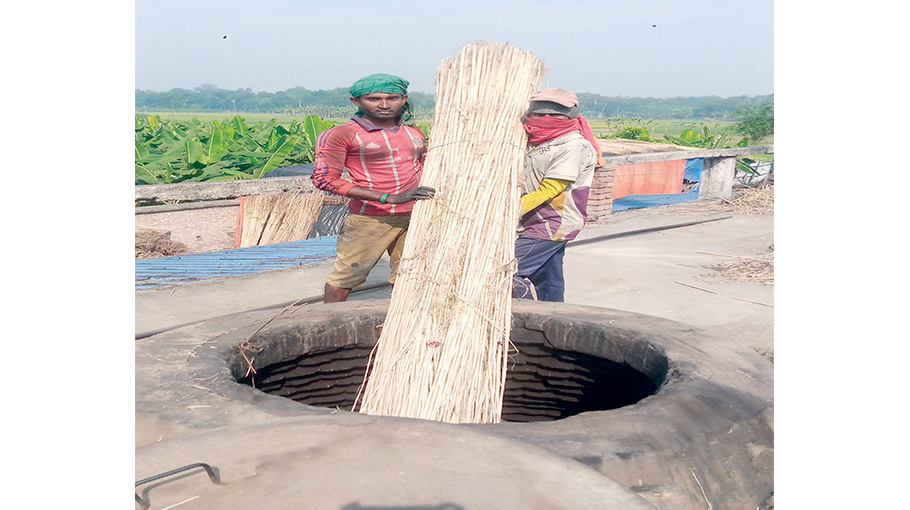Charcoal earns foreign currency, creates huge employment

The ever-neglected and obsolete jute stalks once meant for fuel wood in rural villages, have now become an important item for the country when burnt to make charcoal (coal dust).
The charcoal is sent to China and some other countries that have been purchasing the same from different parts of the world in cash bringing in foreign currency.
This sort of a coal producing factory at Ramnagar area on Dhaka-Magura highway has been providing employment for at least 150 persons including women. They are earning their daily bread from this job. Most of them are earning handsome wages daily. Some AK Azad Laddu of village Ghasiara in Magura has been running the factory aiming at environment-friendly, sustainable and international quality importable charcoal production, marketing, earning foreign currency through export, making skilled manpower, expanding markets nationally and internationally, attracting foreign investment, government incentives during import and expanding the research on the same.
When this correspondent visited the factory Global Carbon Bangladesh Limited, he saw about 50 men and women engaged in making coal, coal dust and packaging activities. Worker Ashraful Alam, 37, when asked said he earns taka 18 thousand a
month working for six days a week. Another 100 men and women engaged in the work draw Taka 18 thousand to 30 thousand each month there, the workers said.
Entrepreneur Laddu said he was encouraged when his mother Sazeda Begum had told him to start working for the factory aiming at a certain income and employment of over a hundred poor people in the locality.
His brother-in-law Mizanur Rahman Mitul has been assisting him since the inception. According to Laddu, he got the factory from another entrepreneur when it was a sick one.
Sonali Bank Limited Magura branch had stood by him and provided financial support. The department of environment in Jashore had approved the factory which was running as per Charcoal Rules of the Ministry of Textile and Jute Mills 2022.
Not only that, to avoid untoward fire incidents, he had taken initiatives. Further, six private ponds are available in the surroundings of the factory.
Laddu said, charcoal, basically containing about 65 to 70 percent carbon, is widely used for water purification, fireworks, antitoxin tablets, cosmetics, photocopiers, computer ink and so on locally and globally.
About 40 such factories have been producing charcoal in Jhenaidah, Magura, Rajbari and Faridpur district bringing in Taka around 40 crore in exporting 7,071.42 tons of charcoal abroad every year. At least 20 thousand unemployed men and women were employed in the sector and earning their bread regularly. As there was no Charcoal Policy for charcoal factory establishment and production so far, a concrete policy for the same was a must in the interest of the nation, said AK Azad Laddu.
Muhammad Rashidul Islam, assistant general manager (AGM) of Sonali Bank Limited when contacted said they were financing the factory which was playing a role in huge employment and earning foreign currency.
The roadside factory brings light of hope for the local poor and needy people, especially women, Muhammad Rashidul Islam said.
Abdul Momen, deputy general manager (DGM) of Sonali Bank Limited in Jhenaidah DGM Office when contacted, said to see the potential of this sort of initiatives locally and internationally, they had invested their finance favouring Global Carbon Bangladesh Limited when they were engaged in using the obsolete jute sticks and sending the finished products abroad and bringing in foreign currency every year.
Further, over a hundred poor and needy men and women were engaged in various sectors of the mills. It has been helping the march towards Smart Bangladesh as desired by the government, DGM Abdul Momen said.




